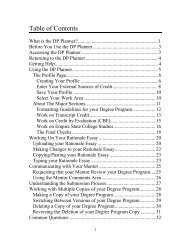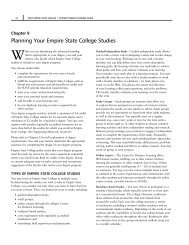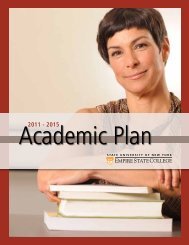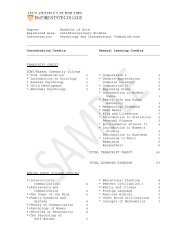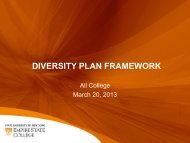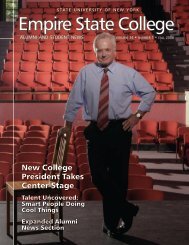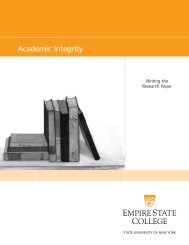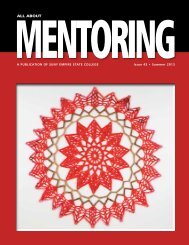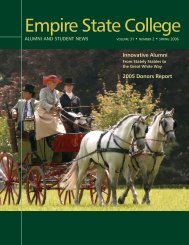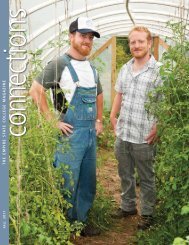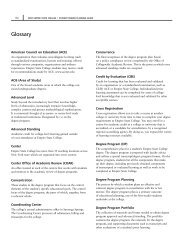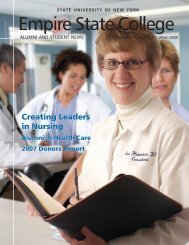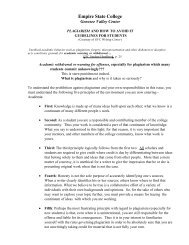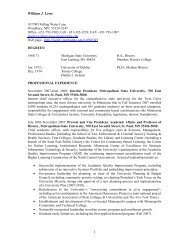All About Mentoring Spring 2011 - SUNY Empire State College
All About Mentoring Spring 2011 - SUNY Empire State College
All About Mentoring Spring 2011 - SUNY Empire State College
You also want an ePaper? Increase the reach of your titles
YUMPU automatically turns print PDFs into web optimized ePapers that Google loves.
76<br />
imagination and a sociological imagination.<br />
In Freire’s later work the picture gets<br />
somewhat more complicated, but there<br />
remains a strong utopian streak to his<br />
thinking. Indeed, it is one thing to liberate<br />
a classroom, but quite another to liberate<br />
a society.<br />
The difficulties posed by Freire’s utopianism,<br />
which Brookfield’s introductory essay in<br />
some ways recreated, animated my reading<br />
of the rest of the essays in this volume. How<br />
might we conceive of an adult education<br />
that aims not so much at “liberation,”<br />
but at providing specific groups in specific<br />
situations the political leverage they need to<br />
improve their lives Or, more bluntly, what<br />
if the goal of “progressive” adult education<br />
programs was not liberation, but power –<br />
political power Of course these are difficult<br />
questions, and they are not necessarily ones<br />
that this collection sets out to answer. But<br />
other essays in this volume lead to some<br />
productive considerations.<br />
In Janise Hurtig and Hal Adams’<br />
contribution, as well as in John Gordon<br />
and Dianne Ramdeholl’s essay, we<br />
find descriptions of how an egalitarian<br />
educational space was created, one in which<br />
students from marginalized backgrounds<br />
felt safe to begin to create and share stories<br />
of their lives. Moreover, as students gained<br />
confidence as writers, as they came to<br />
realize they had important things to say,<br />
a collective dynamic took over. Hurtig<br />
and Adams witnessed an important shift<br />
in their Chicago-based writing workshop,<br />
“a transitional process by which the role<br />
of the educator is increasingly assumed<br />
by the group” (p. 19 ). As the traditional<br />
relationship between teacher and student<br />
breaks down, the practice of “popular<br />
education leaps from being a humanistic,<br />
progressive approach to education to<br />
providing a vision, however modest, of an<br />
egalitarian world” (p. 19). Gordon and<br />
Ramdeholl’s experience in a New York<br />
City adult literacy center revealed a similar<br />
dynamic, one that was rooted not only in<br />
a democratically structured classroom, but<br />
in a program that was itself organized in a<br />
way that gave students a real say. Dialogue<br />
and collective writing, they suggest, not<br />
only “articulated a yearning for freedom,”<br />
but brought “student voices and their life<br />
struggles into the center of the curriculum.”<br />
Further, these practices were “inseparable<br />
from [the program’s] commitment to student<br />
involvement in decision making, to a<br />
democratic community” (p. 32).<br />
But how do we begin to move from the<br />
vision to which Hurtig and Adams refer<br />
to reality, from democratic classrooms<br />
to a democratic society Not easily. As<br />
Hurtig and Adams explain, the program<br />
they directed was not planned as “actionoriented”;<br />
the goal, rather, was the writing<br />
itself. And wouldn’t consciously and openly<br />
designing a program as action-oriented in<br />
itself pose certain difficulties After all, these<br />
programs need funding, and funding might<br />
be hard to get, either from government<br />
sources or foundations, if the stated goal<br />
of a program was, for example, a socialist<br />
revolution! And as Gordon and Ramdeholl<br />
point out, since the 1990s, a tighter funding<br />
landscape has gone hand-in-hand with<br />
accountability standards that have become<br />
increasingly instrumentalist, more tightly<br />
focused on data about how well adult<br />
education programs are preparing students<br />
for employment. In this context, programs<br />
that focus on much beyond job training are<br />
an endangered species.<br />
A closer look at Hurtig and Adams’ essay,<br />
however, shows some room for maneuver,<br />
some space for “praxis.” One workshop,<br />
taught by Adams, was run out of a Chicago<br />
public elementary school. The students’<br />
children attended the school, and many<br />
of them lived with their families in a large<br />
In the process,<br />
they’d discover that<br />
there is a range of<br />
institutions, from<br />
community organizations,<br />
labor unions and<br />
grassroots political<br />
organizations, that are<br />
also reimagining that<br />
world, and fighting in<br />
various ways to create it.<br />
public housing complex nearby. At the time,<br />
the Chicago Housing Authority, under the<br />
direction of the federal HOPE VI program,<br />
was dramatically repurposing its public<br />
housing stock, a process that included<br />
the demolition of some of the city’s larger<br />
projects, followed by the relocation of the<br />
tenants. There was much uncertainty about<br />
the program, and since a number of students<br />
in the workshop lived in a project slated for<br />
demolition, concerns about housing often<br />
came up in discussions and in writing.<br />
Because housing issues had become a<br />
particular focus of the collective effort<br />
of the workshop, when the time came,<br />
that effort moved seamlessly beyond the<br />
classroom. One of the participants faced<br />
sudden eviction, and the group swung into<br />
action to buy her and her family some<br />
all-important time. The principal of the<br />
school, along with other members of the<br />
community, joined forces with them as<br />
they successfully appealed the terms of<br />
the eviction. Here was, without doubt, a<br />
small, but very real victory. How might<br />
the circle of effective struggle be widened<br />
still further It seems to me that, in this<br />
instance, the workshop setting was critical<br />
in creating a common narrative, grounded<br />
in common experiences and concerns about<br />
day-to-day life – in this case, about the<br />
roof over one’s head – that mobilized the<br />
group to take action, however small. This<br />
represents a kind of leadership, one that<br />
needs to be nurtured even further, especially<br />
because of the way in which this particular<br />
issue – housing – was a “live” one, in that<br />
HOPE VI had stirred organized resistance in<br />
Chicago and indeed in other cities.<br />
Essentially, timing matters. Perhaps, back<br />
in a workshop setting, students could be<br />
encouraged to look at the politics of public<br />
housing more generally, explore the broader<br />
structural context of their own particular<br />
struggles, engage the debates that resulted<br />
in HOPE VI, and then, in charge of their<br />
political education, rewrite public housing<br />
policy in their own collective image. In<br />
the process, they’d discover that there is<br />
a range of institutions, from community<br />
organizations, labor unions and grassroots<br />
political organizations, that are also<br />
reimagining that world, and fighting in<br />
various ways to create it. As Mechtild Hart<br />
suggested in her contribution to this volume,<br />
suny empire state college • all about mentoring • issue 39 • spring <strong>2011</strong>



